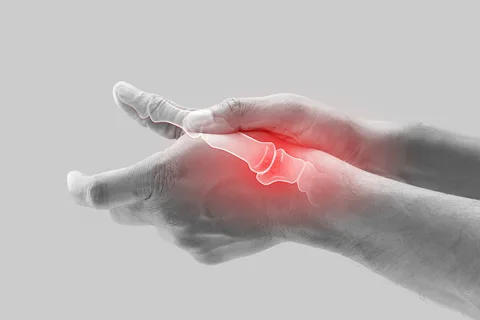The Role of Physical Therapy in Treating Rheumatoid Arthritis Pain

Introduction
Rheumatoid arthritis (RA) is a chronic condition that causes pain, stiffness, and swelling in joints, causing limitations in movement and low energy that impacts overall life. Many people in Edinburgh are undergoing the challenges of RA, which can feel very consuming, especially when it becomes difficult or painful to perform tasks like walking, lifting, or even writing.
Medication is commonly used to help manage symptoms of RA, but physical therapy is equally important for the management of the condition. Working with the best physiotherapist Edinburgh has to offer, through safe exercises, hands-on techniques, and lifestyle advice, physical therapy can reduce pain, improve movement, and regain confidence.
Let’s look at how physical therapy can help people with rheumatoid arthritis and why it is a crucial component of the management of pain and long-term care.
Understanding Rheumatoid Arthritis
Rheumatoid arthritis (RA) is an autoimmune illness in which the body misidentifies healthy joint tissue as "bad" tissue, which leads the body to attack what should be healthy joint tissue. This results in inflammation, pain, and if untreated, damage to joints. RA is different than the normal arthritis that generally comes with age, as RA has the ability to damage the joints of people who are much younger, and many times, at once depending on the person.
Things that many RA sufferers report experiencing include joint stiffness in the morning, swelling, fatigue, and restricted movement. These issues do impact your daily routines and can often be quite frustrating. However, with the properly applied techniques in physical therapy, we can create solutions for you that target your symptoms. In Edinburgh, the best physiotherapist an RA sufferer can work with will be able to show you how to protect your joints, manage pain, and remain independent.
Pain Relief Through Physical Therapy
Many people suffering from rheumatoid arthritis will tell you that one of the major benefits of physical therapy is pain relief. Physiotherapist use a few treatment strategies such as gentle joint mobilization, use of heat or cold, stretching, and soft tissue massage to free up stiffness and decrease inflammation. Heat and cold therapies can ease sore muscles and reduce the inflammation caused by irritated joints.
Exercise is also a good tool. Gentle, low-impact exercises like swimming, walking, and stretching can also help your pain decrease in time. While moving sore joints may seem difficult at first, maintaining regular activity will prevent cells and muscles from tightening that will ultimately lead to more stiffness later. The best physiotherapist in Edinburgh will ensure each exercise is safe and comfortable, and tailored to each person, in their individual conditions. This will also allow 'pain management' to be drawn back from a reliance on medication.
Improving Joint Flexibility and Mobility
Rheumatoid arthritis can limit joint movement and this limitation can cause difficulty in any activity that includes bending, gripping or going up and down stairs. Physical therapy attempts to increase independence through maximizing flexibility and mobility. Specific exercises are designed for the patient to maintain their range of motion, while promoting mobility and avoiding weakened or stiff joints.
Stretching routines are particularly important for maintaining mobility in the hands, wrists, knees, and ankles, which are the joints most affected by rheumatoid arthritis (RA). The more patients engage in these gentle activities, the better they will find less demanding activities such as getting dressed, cooking, or walking. Each patient is matched with the best physiotherapist Edinburgh has to offer who will create exercise programs that match their comfort level and promote work towards progress. Maintaining mobility is crucial in reducing long-term disability and remaining independent.
Strengthening Muscles for Joint Support
Weak muscles can add additional stress to joints affected by RA, resulting in increased pain and fatigue. Because of this, strength training should be considered an essential part of physical therapy. Stronger muscles surrounding painful joints result in support and protection to the body, ultimately reducing stress on the joints and improving overall balance.
Exercises will involve resistance bands, light weights, or body-weight exercises. The best physiotherapist Edinburgh experts are excellent at creating gentle but effective programs, which means patients will no longer need to worry about over-exerting themselves. Stronger muscles will not only decrease pain but also increase energy levels so that everyday tasks are not so tiring. This more proactive approach allows people with RA to feel stronger, and more stable, and move more confidently.
Adapting Daily Habits for Joint Protection
Adapting some of our habits while living with rheumatoid arthritis is essential to help our joints stay protected and to minimize the chance of flare-ups. One of the best resources for advice about proper posture and ergonomics and movement is a physical therapist. Often, it is simply about making small changes such as wearing supportive shoes, sitting with the proper amount of back support, or lifting objects gently. These small adjustments can be useful to help minimize any excessive strain.
Sometimes assistive devices will be recommended to help relieve excess stress on the joints. The best physiotherapist Edinburgh has to offer will help these adaptations become part of our daily lives and will allow people to accomplish activities with less pain and effort. In learning tips and techniques to support protecting our joints, it is possible to manage an active way of living.
Supporting Mental Health and Confidence
Rheumatoid arthritis doesn’t just affect the body it also impacts emotional well-being. Chronic pain and reduced mobility can lead to frustration, anxiety, or even depression. Physical therapy supports mental health by encouraging progress, boosting confidence, and creating achievable goals.
Working with a physiotherapist provides a sense of partnership. Patients are reminded they are not facing RA alone. Each small improvement, whether in movement or pain reduction, builds motivation. With the help of the best physiotherapist Edinburgh residents trust, patients regain control over their health and begin to see a brighter path forward. Emotional strength is just as important as physical progress in long-term recovery.
Conclusion
Rheumatoid arthritis may be a lifelong condition, but it doesn’t have to define daily life. With the right care, it’s possible to reduce pain, improve mobility, and live more actively. Physical therapy plays a powerful role in managing RA symptoms by focusing on pain relief, strengthening, flexibility, and joint protection.
By working with the best physiotherapist Edinburgh offers, patients receive personalized care designed to meet their unique needs. This combination of professional support and daily practice empowers individuals to face rheumatoid arthritis with confidence and resilience.








